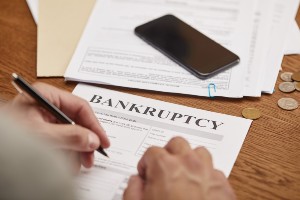
How do you determine whether bankruptcy or repossession is worse for you?
What is Bankruptcy?
Bankruptcy is a legal process where a debtor goes through intense scrutiny in court to discharge their debts. This process is initiated by the debtor and is meant to help them get a fresh start by eliminating most of their outstanding debts. For individuals, there are two types of bankruptcy, Chapter 7 and Chapter 13.
What is Repossession?
On the other hand, repossession is when the lender takes possession of the collateral you used to secure your loan. The most common form of repossession is when a lender repossesses cars for missed payments. Collateral can be any valuable asset such as a home, car, or business equipment. When you start to fall behind on payments, the lender has the legal right to repossess the collateral.
Bankruptcy Protection
When a borrower files for bankruptcy, the automatic stay goes into effect immediately. This stay prohibits creditors from trying to collect any debt from the borrower. Repossession doesn’t offer this type of protection.
Your credit is another concern.
One of the most significant differences between bankruptcy and repossession is how they impact a borrower’s credit score. A bankruptcy filing can significantly reduce your credit score and remain on your credit report for up to ten years. However, once a debtor completes the bankruptcy process, they can begin rebuilding their credit score.
In contrast, repossession has a significant impact on a credit score. It shows as a default on the credit report and remains there for seven years. Repossession stays on a credit report longer than missed payments or bankruptcy. A repossession could lead to a severe blow to one’s credit score, and it might take a while longer to rebuild it when compared to bankruptcy.
An Attorney Can Help You Determine How to Proceed
Bankruptcy and repossession have similarities and distinct differences. While they are both financially challenging processes that you’d want to avoid, bankruptcy is a legal process that provides a fresh start for individuals. It can rebuild your credit score and eliminate most of your unsecured debt.
Repossession, on the other hand, is a process by which a lender takes your secured asset. As a result of repossession, you could end up losing your credit score for up to seven years. Thus, it’s wise to avoid repossession by making your payments on time or opting for bankruptcy if it’s in your best interest.
Figuring out whether repossession or bankruptcy will hurt you more based on your circumstances can feel overwhelming. An attorney can evaluate your situation and help you decide how to proceed.
For more information, contact the Law Offices of Robert M. Geller at 813-254-5696 to schedule a free consultation with an experienced attorney.



























![Signs That You May Need to File Bankruptcy [Infographic]](https://djml3wkzi26ea.cloudfront.net/wp-content/uploads/2021/01/signs-chap7-v-chap13.jpg)
![How To File for Bankruptcy [Infographic]](https://djml3wkzi26ea.cloudfront.net/wp-content/uploads/2020/07/bankruptcy-steps-infographic-web.jpg)










